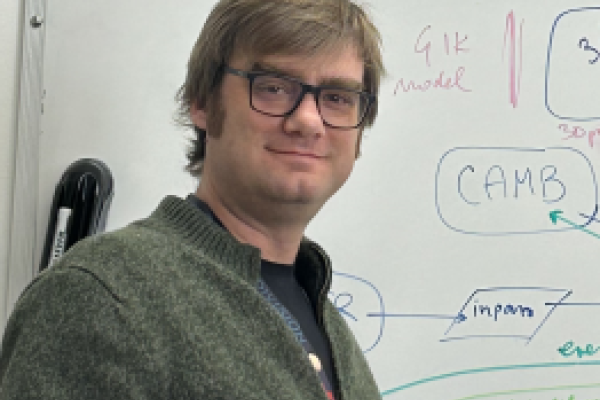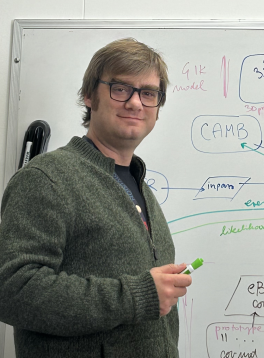
Dr. Eric Huff, NASA’s Jet Propulsion Laboratory
Expanding the horizons of survey cosmology with new methods, models and probes
Location: 1080 Physics Research Building, Smith Seminar Room
Faculty Host: Amy Connolly

Abstract:
The discovery of the accelerating Universe in the late 90’s launched an era of survey cosmology, with several wide-field spectroscopic and imaging surveys planned over the following two decades. The launch of the Nancy Grace Roman Space Telescope later this decade will mark the beginning of the end of this era. At that time the key cosmological survey programs will be operating, and we will be collecting a vast treasury of data of unprecedented sensitivity and quality with which to try to understand the phenomenology of dark energy.
We do not yet fully understand how to use all of these data. Big improvements are needed both in how we model cosmological signals in the presence of real astrophysics, how we extract from these surveys signals that we can trust, and most especially how we can best use each of these programs in combination with the others
In this talk, I will review recent progress in survey cosmology, focusing on what we’ve learned from the Dark Energy Survey. I’ll outline work our group at NASA’s Jet Propulsion Laboratory is doing to improve models of large-scale structure so as to allow us to combine spectroscopic and imaging data. I’ll talk about recent methodological breakthroughs we’ve made that may allow us to `blindly’ detect, map, and remove systematic errors from maps of large-scale structure, using the combination of unlike surveys. Finally, I’ll describe work we’re doing on a new probe of gravitational lensing that promises to dramatically reduce the dominant source of noise in lensing measurements of large-scale structure, potentially opening up new discovery space for the next generation of cosmological probes. I’ll show our team’s most recent progress on simulating this measurement, and my ongoing pilot programs designed to detect it.
Bio: Dr. Eric Huff was raised in Bullhead City, Arizona, and followed an early passion for physics to college in Tucson and a PhD at Berkeley, after which he spent four years as a CCAPP fellow at the Ohio State University. He's done original work on a variety of topics, ranging from observational cosmology to tidal modeling of surface features on Jovian moons.. Currently, he is permanent staff at NASA’s Jet Propulsion Laboratory in Pasadena, where he co-leads the Dark Sector cosmology group. His research focuses on developing new methods for extracting precise and accurate cosmology from wide-field cosmological survey programs. He has made significant contributions to shear measurement in the Dark Energy Survey, and is a member of the US Euclid Consortium.
